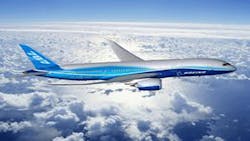TOKYO -- Japan's All Nippon Airways said Monday it was grounding its fleet of Dreamliners until at least the end of May, with no end in sight to woes for Boeing's next generation plane.
The airline is cancelling 1,714 flights in April and May, a period that includes Japan's busy Golden Week holidays, taking the total affected to more than 3,600 since the Dreamliner was ordered out of the skies in January.
Of the newly-announced cancellations, 1,250 are domestic and 464 are international flights, including those bound for Seoul, Seattle and Frankfurt.
"Unfortunately, it includes Golden Week, but we have decided to inform our customers in advance as the prospect for their resumption is still unseen," a company spokeswoman said.
ANA is Boeing's biggest Dreamliner customer so far, with 17 of the world's 50 operational 787s.
The next-generation aircraft has suffered a series of glitches culminating in a global alert from the US Federal Aviation Administration after two incidents involving the battery packs.
All operational 787s were grounded in January after smoke was detected mid-air on a flight in Japan. That incident came just days after the lithium-ion battery caught fire on a Japan Airlines-operated plane parked at a U.S. airport.
ANA's announcement is a further setback for Boeing, which has bet heavily on the 787, hoping its lightweight carbon fibre body would appeal to airlines desperate to clamp down on spiraling fuel costs.
Last week US operator United Airlines said it was taking its six Boeing 787s out of service through June 5, except for the launch a Denver-Tokyo route on May 12 if circumstances allowed.
That came as Boeing said it had proposed a fix for the battery issues, but had not yet convinced U.S. safety regulators it has a sufficient handle on the problem.
On Friday, the Federal Aviation Administration said it was reviewing a plan by the aircraft manufacturer after meeting with senior executives.
"The safety of the flying public is our top priority and we won't allow the 787 to return to commercial service until we're confident that any proposed solution has addressed the battery failure risks," the FAA said.
Boeing had earlier said it was "encouraged by the progress" being made in the battery probe, which it hopes will allow it to get its plane back in the skies.
However, the extent of the problems and the potential complexity in addressing them remains unknown, triggering mounting speculation on how long the groundings will last.
Aviation expert Richard Aboulafia of the Teal Group said that if the FAA accepted the Boeing fix, the 787 could be flying again in April, but he added: "There's a very good chance that they won't."
"We don't know to what extent it is a temporary fix and if it is accompanied by a broader solution that's not going to work as a long-term fix," he said.
Boeing said it was working around the clock with teams of hundreds of experts on the issue, and working closely with the FAA and other authorities.
The New York Times reported last week that Boeing had zeroed in on how lithium-ion batteries could fail and concluded they would be safe to use after making changes, such as adding insulation between the cells.
Japanese engineers said Friday they had identified the cause of fuel leaks the plane had suffered, but were still working on the battery problems.
The nation's transport ministry said the leaks were caused by defective paintwork and impurities getting into a fuel valve, adding that it had already ordered the airline to take measures to remedy the problem.
Boeing halted 787 deliveries shortly after the planes were grounded on January 16 but continued to produce 787s at a rate of five per month.
Last week, Boeing's European arch-rival Airbus said it decided to drop lithium-ion batteries planned for the new A350 aircraft it is developing and use heavier nickel-cadmium batteries instead.
-Shingo Ito, AFP
Copyright Agence France-Presse, 2013
About the Author
Agence France-Presse
Copyright Agence France-Presse, 2002-2025. AFP text, photos, graphics and logos shall not be reproduced, published, broadcast, rewritten for broadcast or publication or redistributed directly or indirectly in any medium. AFP shall not be held liable for any delays, inaccuracies, errors or omissions in any AFP content, or for any actions taken in consequence.
